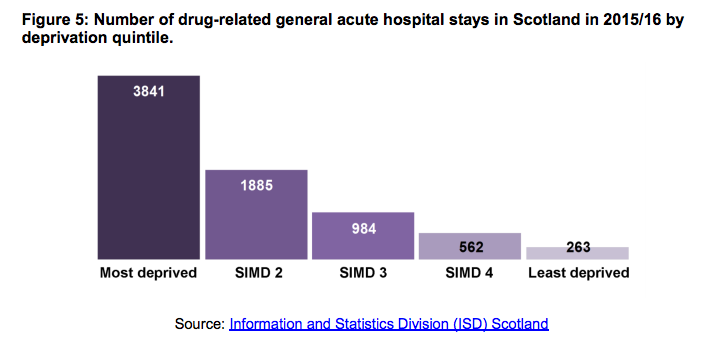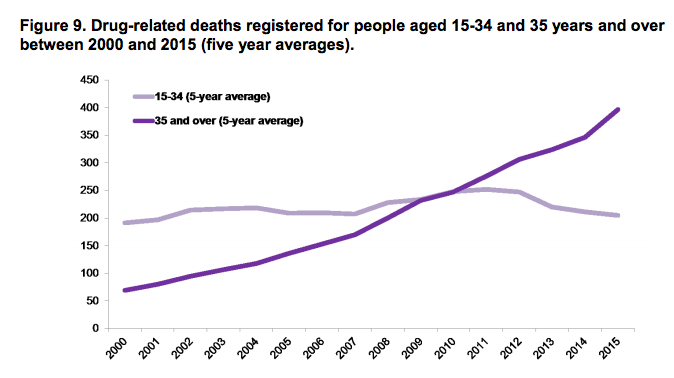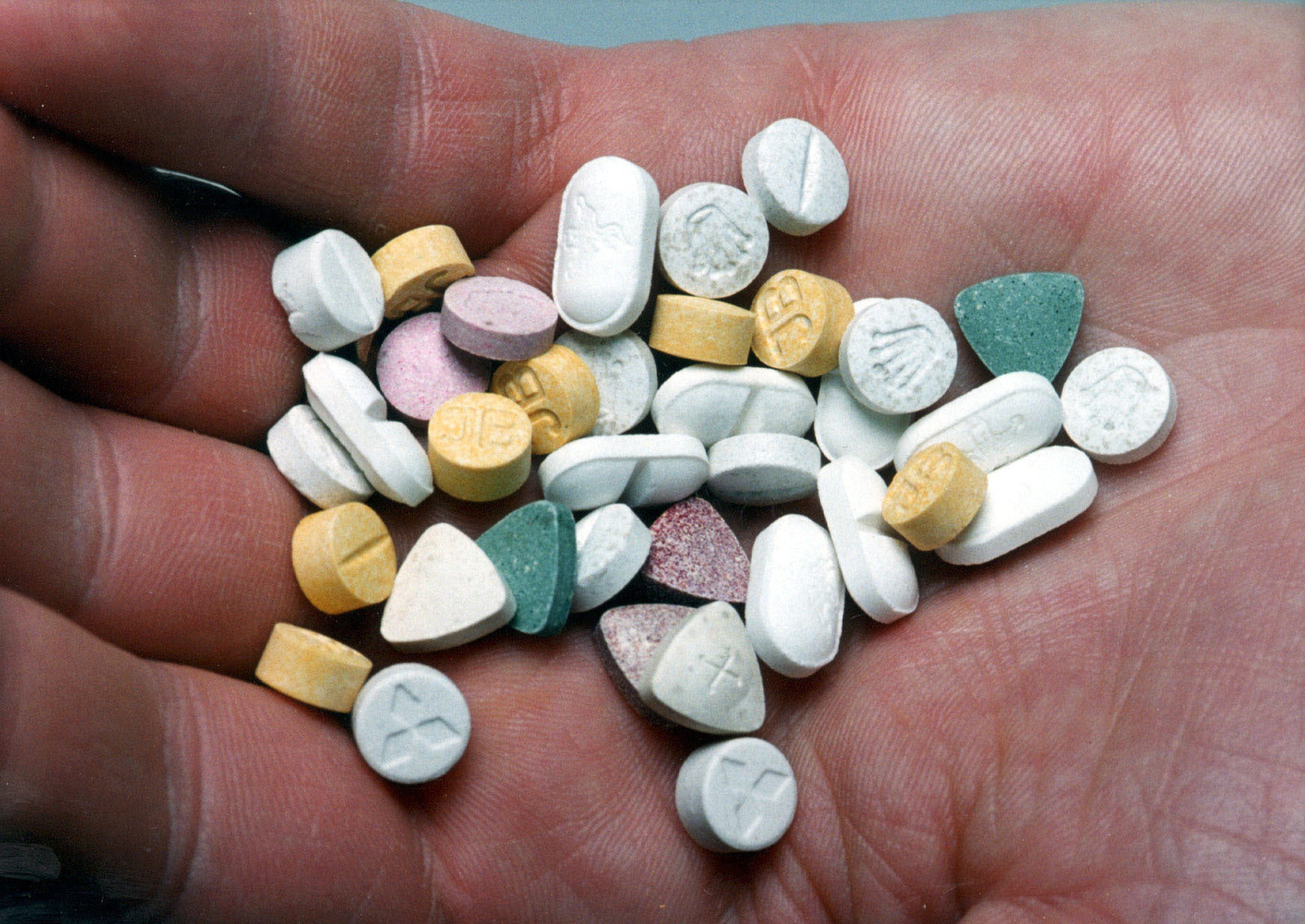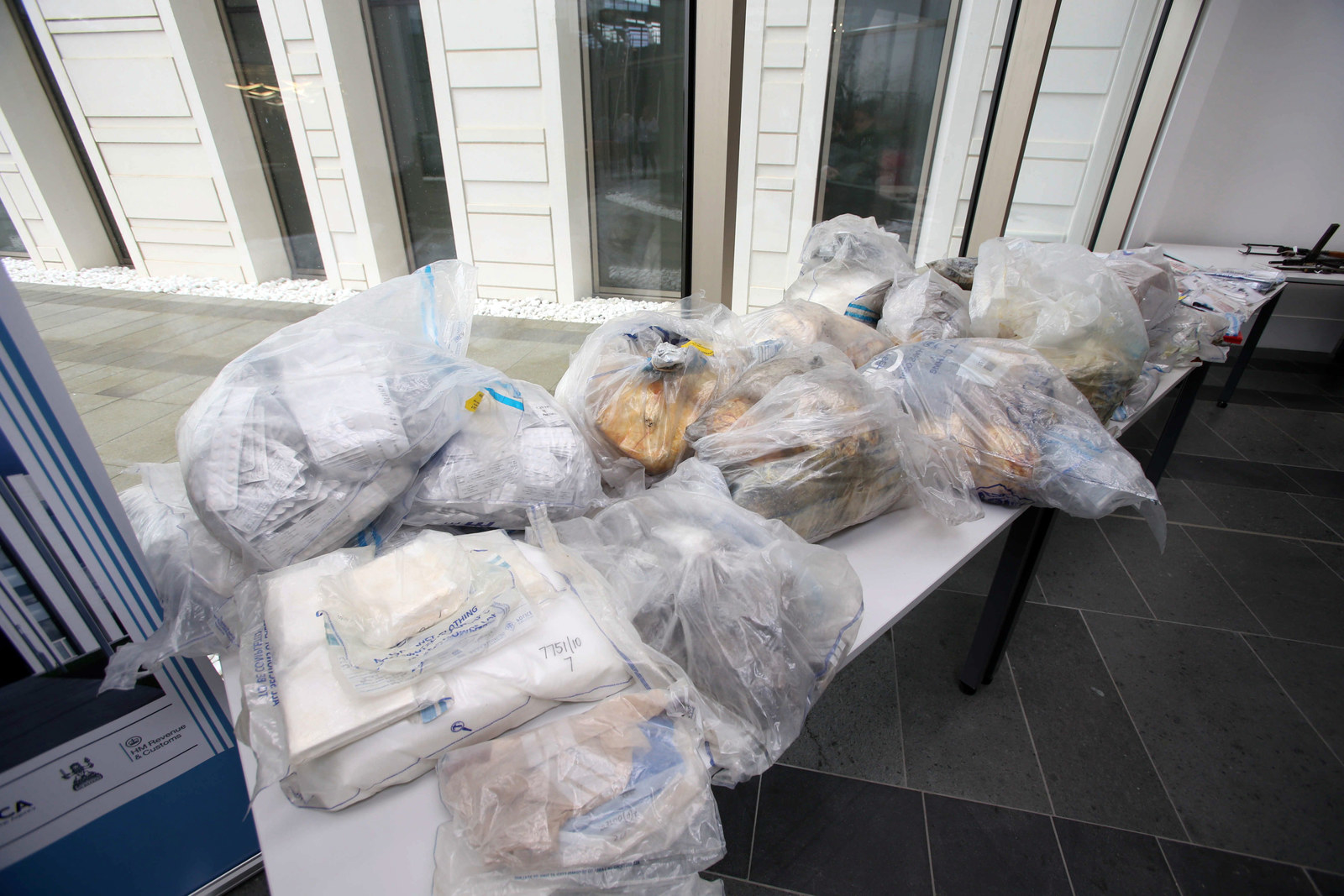
Scotland has the highest rate of drug-related deaths in the EU and over twice as many people die as a result of drug use north of the border than in England and Wales, according to recent figures.
The new figures, released by the National Records of Scotland on Tuesday, show that the number of drug-related deaths in Scotland has more than doubled since 2006, with 160 people in every million dying as a result of drug use.
The drugs charity Release Drugs, which is a national centre for experts on drug policy and law, compared the new figure with countries across the EU and showed how the problem is so much worse in Scotland.
Previous tweet was mistakenly undervalued. Correct drug deaths per 1 million: Portugal - 6 EU Average - 20 Eng & W… https://t.co/fxveapP14o
Policy experts from Scottish universities and drug charities explained to BuzzFeed News why the problem has become so bad in Scotland, and what can be done to avoid the worsening of drug-related death rates in the country.
1. Since the 1980s, Scotland has had a higher concentration of deprived areas than the UK as a whole.

Experts believe the problem is not unique to Scotland, but rather that it is being seen in areas throughout the UK that have experienced deprivation since the Thatcher governments of the 1980s, and Scotland is the clearest example.
A recent report from NHS Health Scotland and the University of Glasgow concluded that an "erosion of hope" in communities that experienced unemployment in the 1980s caused an uptake in substance abuse, with a delayed health impact.
A further report from the Scottish Drugs Forum said that there were "strong links" between deprivation and drug use, and that the unemployment rate among people with opiate or benzodiazepine (known as "benzos") drug problems in Scotland was 85%.
While communities in England also suffered from unemployment due to 1980s government policies, drug-related death statistics for England also include many more wealthier communities and balance out the numbers.
Dr Anna Ross, an expert in drug policy at the University of Edinburgh, told BuzzFeed News that a higher concentration of communities in Scotland were left hopeless in the 1980s and have been further punished by recent austerity.

"The main cause is the result of ageing cohorts from Thatcher policies of the 1980s, which saw large swaths of small communities decimated with unemployment and no hope of finding other employment," said Ross.
"English figures take into account wealthy boroughs and not-so-wealthy boroughs, so it’s countered by some places with very low drug death figures. Scotland only has 5 million people and a much higher proportion in poverty due to deindustrialization – that’s what we’re seeing now."
David Liddell, CEO of the Scottish Drugs Forum, told BuzzFeed News: "If we map problem drug use – defined around opiate and benzodiazepine use – there is a close relationship between deprivation and problem drug use.
"This is not a lifestyle choice by individuals but it is a way of life in the absence of more meaningful and varied activity and in the presence of trauma, mental health, alienation, isolation, and stigma."
2. Decades of deprivation have created an older group of drug users who are more at risk of death.

One of the most notable points in the figures released by the NRS this week was that the over-35 age group accounted for 72% of the total number of drug deaths in 2016 in Scotland, and the median age of drug-related death was 41.
Conversely, only 5% of the deaths were made up of those who were under 24.
Experts believe that the growing death figures in older people show the deprivation of the 1980s and beyond has had delayed health consequences and has resulted in the deaths of older drug users over the past 10 years.
The graph below shows that, in terms of five-year averages, the 15–34 group of Scots experienced a higher rate of drugs-related death than the over-35s until around 2009, but deaths among over-35s are now rapidly increasing.

Avinash Tharoor from Release Drugs told BuzzFeed News: "One factor is the ageing population of people who use opioids, particularly heroin. You may have heard this group referred to as the 'Trainspotting generation'.
"Decades of problematic drug use have led to comorbidities [a disease co-occurring with another disease], such as COPD [chronic obstructive pulmonary disease], hepatitis C, and other conditions which leave people more susceptible to overdose."
Aileen Campbell, the Scottish government minister for public health, said this week's findings were evidence of a "drugs misuse problem stretching back decades" and that it was part of a wider trend affecting the UK and Europe.
"We're seeing an ageing group of people who are long-term drugs users," said Campbell. "They have a pattern of addiction which is difficult to break, and they've developed other chronic medical conditions as a result of this prolonged drugs use."
3. Drug support funding in Scotland was cut by over 20%.

The Scottish government cut direct funding for alcohol and drug prevention, treatment, and support services by £16 million (22%) last year, asking the NHS to make up the difference to avoid a drop in service quality.
However, experts believe these cuts are actually deeper as services provided by councils may also have been slashed in recent years, partly because helping drug users is considered a low priority compared with preserving other services.
"You have a cohort of people decimated in the first round of austerity cuts and have now been hit again, this time round by the lack of funding," said Ross. "Austerity is hitting the poorer communities by a reduction in funding for local councils and they’re having to make decisions on where that goes.
"Drug services are the first to go because they’re considered the lowest of the low – when they’re making decisions between nurseries and drug treatment centres, they cut the drug treatment centres."
Dr Peter Bennie, chair of BMA Scotland, said in April that the NHS budget is incapable of stretching to replace the drug and alcohol services that were provided with funding that's been cut by the Scottish government.
"As doctors we see first-hand the damage that alcohol misuse does to patients and their families," said Bennie. "Amongst other conditions it can directly lead to liver disease, damage mental health, and significantly increase a person’s risk of developing cancer.
"At a time when NHS resources are stretched like never before, we simply cannot afford to continue the cycle that sees major pressures unnecessarily put upon the health service as a result of alcohol."
4. Drug problems in Scotland are higher per head than in the rest of the UK.

Figures show that the estimated number of high-risk drug users in Scotland massively outstrips the number estimated for England, and is slightly higher than the number estimated for Wales, leading to more drug-related deaths.
The numbers, which were produced by the European Monitoring Centre for Drugs and Drug Addiction, show that around 16.8 in every 1,000 people in Scotland are high-risk drug users, with 15.4 in Wales and only 8.4 in England.
David Liddell from the Scottish Drugs Forum explained: "[Drug-related deaths] in Scotland are higher firstly because Scotland’s drug problem is much greater per head of population. Scotland has 61,500 people with a drug problem and the England and Wales figure is in the region of 300,000.
"Secondly we appear to have a small proportion of people with a drug problem retained in treatment long-term, compared to England and Wales – putting people at greater risk of fatal overdose. These two factors mean that, per head of population, drug deaths in Scotland are amongst the highest in Europe."
Liddell added: "[Scotland] may [also] have less stimulant use and more use of depressants – benzos, opiates, and alcohol. It could be argued they are more damaging and more likely to lead to long-term dependence."
However, Scottish government figures show that illicit drug use in Scotland is falling, with 6% of adults reported to be using one or more illicit drugs in 2014/15, down from 7.6% in 2008/09 – although calculating exact drug use is difficult.
5. Experts think government policy on helping drug users is harmful rather than helpful.

Some experts argue that the way in which the government deals with drug users actually increases the likelihood of drug-related deaths because it is too heavily focused on abstinence, prohibition, and criminalisation.
"We believe diverting people who use drugs away from the criminal justice system would be an important first step in reducing the drug-related deaths rate," said Tharoor from the Release Drugs charity.
"We can see the impact this can have by looking at Portugal – which decriminalised all drug possession and use in 2001 – which has a drug-related death rate of 6 per 1 million, compared to Scotland’s 160 per 1 million."
Iain McPhee from the University of the West of Scotland said that it's been known since the 1990s that a recovery programme that focuses solely on abstinence is more likely to increase harm than decrease it.
"We’ve known this for a long time but the government policy is focused on a strengthening commitment to prohibition and a strong focus on recovery-orientated, which essentially means abstinence as the definition of treatment success," he said.
"These are called 'high-threshold' – treatment entry requirements require abstinence before you can get into a rehabilitation centre, or a requirement for abstinence in order to continue counselling and other supports.
"In combination, the lack of focus and funding towards actual harm reduction – reducing the harm associated with drug-taking rather than demanding abstinence – has had a great impact on these figures."
Tharoor added: "Scotland’s drug laws are controlled by Westminster, so Holyrood cannot change the legislation on criminalisation of drug possession offences.
"However, the government can work with Police Scotland and the Lord Advocate to implement de facto decriminalisation, whereby people do not face criminal penalties for personal drug possession or use."
